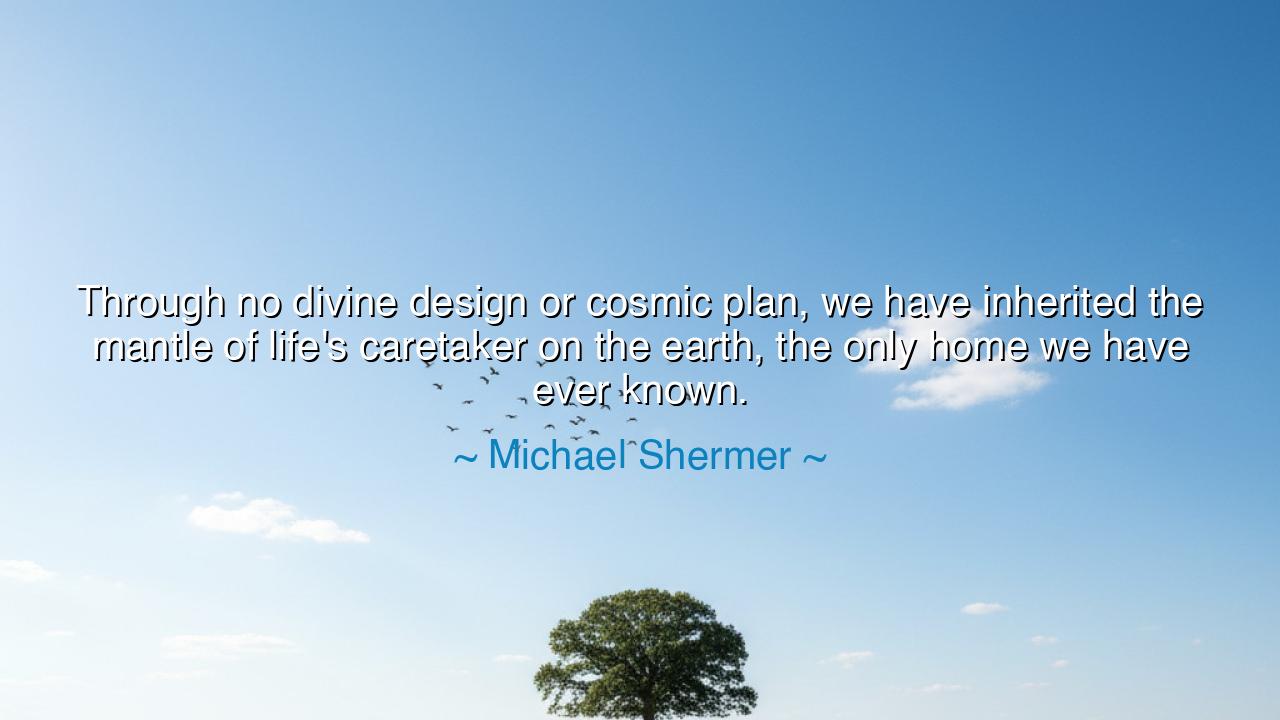
Through no divine design or cosmic plan, we have inherited the
Through no divine design or cosmic plan, we have inherited the mantle of life's caretaker on the earth, the only home we have ever known.






“Through no divine design or cosmic plan, we have inherited the mantle of life's caretaker on the earth, the only home we have ever known.” Thus spoke Michael Shermer, a philosopher of reason and a seeker of truth in the modern age, whose words remind humanity of both its humility and its sacred responsibility. In this reflection, Shermer calls us not to worship our power, but to accept our duty—to recognize that by chance, by evolution, by the mysterious unfolding of nature itself, we have become the guardians of life upon this fragile sphere we call home.
The ancients would have understood this in their own way. They told stories of gods who placed mankind in gardens, of stewards set to watch over creation. But Shermer speaks not of divine assignment, not of celestial decree. He tells a harder truth, one born not of myth but of reality: that no cosmic plan appointed us, and yet here we stand—the most conscious of all creatures, the only beings known to gaze upon the stars and understand what they are. From the chaos of evolution, we have emerged as thinkers, builders, dreamers—and thus, caretakers. Whether by purpose or accident, the mantle is ours to bear.
It is a sobering inheritance. For when Shermer says we are “life’s caretakers,” he speaks not of dominion, but of stewardship. We were not given the world to rule, but to protect. The forests breathe our air; the oceans cradle our history; the creatures of the land and sky share our fate. Yet humanity, in its pride, too often forgets this kinship. We poison the waters that nourish us, burn the forests that shelter us, and fill the heavens with smoke while calling it progress. Shermer’s words are a mirror, showing us that though we may not be gods, we have acquired godlike power—and with it, the moral weight of responsibility without divine oversight.
History offers warnings written in the ruins of our own making. Consider the fall of Easter Island, where a great people felled every tree on their land in pursuit of monument and ambition. They built statues to their gods but destroyed the very world that sustained them. When the last tree fell, their civilization fell with it. There was no divine punishment—only the natural consequence of forgetting their place in the balance of life. Shermer’s insight echoes across centuries: when we fail as caretakers, the earth will not weep; it will simply move on without us.
And yet, there is hope within his words, for acknowledgment is the beginning of wisdom. If we are not chosen by heaven, then our destiny remains in our own hands. The absence of divine design does not strip life of meaning—it gives it to us to create meaning through action. We become moral not because a god commands it, but because we understand the fragility of what exists. To protect the world, to nurture its beauty, to preserve its wonder—this is to rise above our randomness and turn chance into purpose.
The modern age offers examples of this awakening. When the Earth was first seen from space, fragile and blue against the darkness, the astronauts wept—not out of triumph, but out of awe. That moment, captured in the photograph known as “Earthrise,” changed how humanity saw itself. Nations at war paused to glimpse their shared home, suspended in eternity. There, floating in the void, was proof of what Shermer describes: a planet without cosmic privilege, yet holding the only spark of life we know. That image whispered an ancient truth reborn—we are one species, one family, bound to one home.
So let this be the teaching drawn from Shermer’s words: accept your inheritance, and rise to meet it. Do not wait for gods or destiny to save the world, for neither will come. The task is ours—to guard the forests, to heal the waters, to ensure that life’s melody does not fade into silence. Let every act of compassion, every seed planted, every injustice challenged be a testament to your understanding that existence itself is miracle enough.
For as Michael Shermer reminds us, the universe owes us nothing—but life has given us everything. We are not chosen, but we are capable. Not designed, but determined. And if we, the children of chance, choose to care for this earth with wisdom and love, then we will have fulfilled the highest calling of any being—to turn randomness into reverence, and inheritance into honor.






AAdministratorAdministrator
Welcome, honored guests. Please leave a comment, we will respond soon